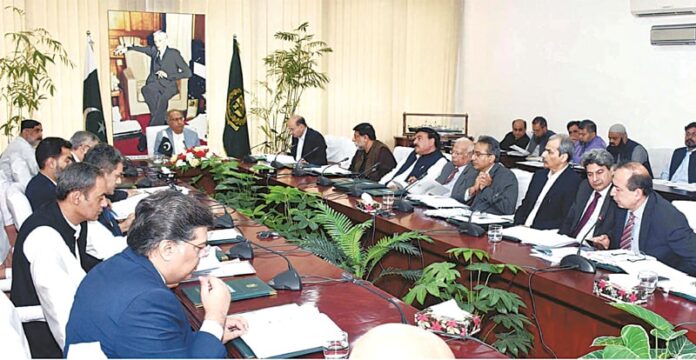–ECC approves technical supplementary grant of Rs1bn for establishment of Pakistan Tourism Development Endowment Fund
–Finance ministry directed to chalk out ways to improve Pakistan State Oil’s liquidity
ISLAMABAD: As construction work on the multibillion-dollar Turkmenistan-Afghanistan-Pakistan-India (TAPI) Gas Pipeline Project was supposed to start in the first quarter of 2020, Pakistan has decided not to accept the agreed price of the imported gas, as the same was to be much costlier when compared with LNG and mixed gas prices in the country.
According to sources, the Economic Coordination Committee (ECC), which met on Wednesday with Adviser to PM on Finance in the chair, was informed that the price of gas under TAPI project would be much higher than the LNG/mixed gas available in the country.
The price of gas, to be imported from Turkmenistan, was needed to be renegotiated before going for construction of the pipeline in Pakistan.
Under the TAPI project, a 56-inch diameter pipeline, spread over 1,680km and having a capacity of transmitting 3.2 billion cubic feet per day (bcfd) of gas, would be laid from Turkmenistan through Afghanistan and Pakistan to the Pak-India border by the year 2022.
According to sources, the ECC was informed that a new gas price formula was needed to be worked out to make the imported gas comparatively competitive. The gas price formula under which the gas prices of every buying country (Afghanistan, Pakistan and India) worked out was also way too complicated. Pakistan wants the reference price of LNG, which was currently cheaper in the open market, as an alternative to the TAPI gas.
As per the officials at the finance ministry, the ECC, after the Ministry of Energy’s briefing, decided to constitute a price negotiation committee (PNC) for TAPI project, which would renegotiate the price with Turkmen gas.
According to sources, India had earlier also found the landed price of Turkmen gas as $10 per mmBtu too high, besides its concerns about cutting the supply in case of any conflict with Pakistan.
The ECC was informed that no guarantee would be given to India for uninterrupted gas supply as demanded by Delhi under this project.
Meanwhile, the ECC refused to give any supplementary grant for the Sui Southern Gas Company (SSGC) against its liabilities on Pakistan Steel Mills (PSM), citing reasons of agreement with IMF.
Under the IMF terms, no major supplementary grants were to be given by the government. However, on the demand moved by the Ministry of Industries and Production for Rs3.02 billion payment of outstanding dues of SSGC by PSM on account of gas bills, the ECC directed to constitute a three-member committee, under the chairmanship of the finance secretary, to find out a feasible solution to the issue so that the already allocated budget may not be exceeded and liabilities of both SSGC and PSM are duly settled.
The ECC, however, approved a technical supplementary grant of Rs1.00 billion for the establishment of Pakistan Tourism Development Endowment Fund. The chair directed Pakistan Tourism Development Corporation to come up with their tourism development and soft image promotion plan in the next meeting.
The committee also granted approval to allocate gas from PGNiG’s RIZQ gas field to SSGC. It was briefed to the ECC that currently, two wells – Rizq-1 and Rizq-2 – are producing 16MMCFD gas, whereas Rizq-3, which is under drilling, is expected to add another 9 to 10MMCFD gas to the existing production. Upon completion of this well, the cumulative gas production from this gas field is expected to raise up to 25MMCFD.
Moreover, the ECC directed the Ministry of Finance to explore possibilities to improve the liquidity position of Pakistan State Oil as exchange losses of around Rs28 billion have incurred on FE-25 loans by PSO. The loans were acquired under the instructions of the Ministry of Finance for the financing of import operations at PSO.
The committee also granted an extension of government’s guarantee against credit facility of National Bank of Pakistan amounting to Rs5 billion in favour of Utility Stores Corporation of Pakistan.




